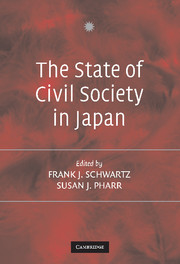Book contents
- Frontmatter
- Contents
- Tables and Figures
- Contributors
- Preface
- The State of Civil Society in Japan
- PART I CONTEXT
- 1 What Is Civil Society?
- 2 From Meiji to Heisei: The State and Civil Society in Japan
- 3 Capitalism and Civil Society in Postwar Japan: Perspectives from Intellectual History
- PART II THE ASSOCIATIONAL SPHERE
- PART III THE NONMARKET ACTIVITIES OF ECONOMIC ACTORS
- PART IV STATE-CIVIL SOCIETY LINKAGES
- PART V GLOBALIZATION AND VALUE CHANGE
- Bibliography
- Author Index
- Subject Index
2 - From Meiji to Heisei: The State and Civil Society in Japan
Published online by Cambridge University Press: 05 July 2014
- Frontmatter
- Contents
- Tables and Figures
- Contributors
- Preface
- The State of Civil Society in Japan
- PART I CONTEXT
- 1 What Is Civil Society?
- 2 From Meiji to Heisei: The State and Civil Society in Japan
- 3 Capitalism and Civil Society in Postwar Japan: Perspectives from Intellectual History
- PART II THE ASSOCIATIONAL SPHERE
- PART III THE NONMARKET ACTIVITIES OF ECONOMIC ACTORS
- PART IV STATE-CIVIL SOCIETY LINKAGES
- PART V GLOBALIZATION AND VALUE CHANGE
- Bibliography
- Author Index
- Subject Index
Summary
“Civil society” may well be the Holy Grail of our time. Scholars and statesmen seek it with a fervor that borders on the spiritual. And recognizing it among the more mundane chalices has stymied many in their quest. For a historian of state-society relations like myself, the Charge of investigating civil society in Japan raises a thorny set of problems. Civil society has occupied an important place in modern Japan, I argue. Yet if we are to appreciate its complexities, we must first consider the limitations of a historically applying “civil society” to Japan.
The idea of civil society is rooted in a time and a place. Both are distant from modern Japan. Its origins are distinctly European, dating back to the classical Greek term koinonia politike and the Roman societas civilis. For much of European history, civil society referred to self-governing towns or cities. The emphasis was on the word “civil,” which connoted a “citizen,” or a member of the polity endowed with certain rights to participate in governance. The concept of civil society assumed its present-day meaning, most scholars agree, during the latter half of the eighteenth Century and the early nineteenth Century in Western Europe. Particularly in the Anglo-American world and France, “civil society” began to describe a society or Space that not only lay outside the control of the State but whose vibrant exchange of ideas monitored and limited State authority. Against the backdrop of the American and French revolutions, this new type of civil society grew out of a “fear of State despotism” (Keane 1988b: 35-39, 65). In this sense, civil society was composed of voluntary, self-organized associations, such as learned and reading societies, moral reform groups, and Masonic lodges (Trentmann 2000: 1).
- Type
- Chapter
- Information
- The State of Civil Society in Japan , pp. 42 - 62Publisher: Cambridge University PressPrint publication year: 2003
- 19
- Cited by



